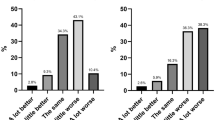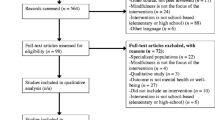Abstract
Self-management education programs (SMEPs) have demonstrated a measurable benefit in enhancing self-efficacy, increasing health knowledge, and improving both health behaviors and physical symptoms associated with underlying conditions in multiple chronic disease populations. Adolescent and young adult (AYA) survivors of childhood cancer, defined as individuals ages 15 to 39 years, are at a high risk for adverse health outcomes due to late complications from previous cancer treatments, knowledge deficits of their risks, and complex socioeconomic challenges associated with transitional periods in their lives. We performed a literature review and environmental scan to systematically survey and interpret relevant SMEPs to identify opportunities for their development specific to the AYA population. Despite evidence existing for the importance of self-management and general educational messages for survivors of childhood cancer, very few evidence-based interventions have been developed for the AYA population. Most SMEPs for cancer survivors are geared towards individuals with cancer in adulthood. Among the limited interventions directed at survivors of childhood cancer, they are focused on individual health behaviors, such as physical exercise, mental health, nutrition, or self-efficacy. Given the ever-growing technological footprint in our daily lives, mobile health (mHealth) applications may be the most efficacious means of delivering self-management education to this specific population. As content is developed through mHealth applications as well as other platforms, they will need to be rigorously evaluated, given their potential to compliment survivor-focused care.
Similar content being viewed by others
References
Howlader N, AM Noone, M. Krapcho, D. Miller, K. Bishop, CL Kosary, M. Yu, J. Ruhl, Z. Tatalovich, A. Mariotto, DR Lewis, HS Chen, EF Feur, KA Cronin. SEER Cancer Statistics Review, 1975–2014, National Cancer Institute. Bethesda, MD, https://seer.cancer.gov/csr/1975_2014/, based on November 2016 SEER data submission, posted to the SEER web site, April 2017. Accessed 20 February 2018
Robinson LL, Hudson MM (2014) Survivors of childhood and adolescent cancer: life-long risks and responsibilities. Nat Rev Cancer 14(1):61–70
Oeffinger KC, Mertens AC, Sklar CA, Kawashima T, Judson MM, Meadows AT, Friedman DL, Marina N, Hobbie W, Kadan-Lottick NS, Schwartz CL, Leisenring W, Robinson LL (2006) Chronic health conditions in adult survivors of childhood cancer. N Engl J Med 355(15):1572–1582
Kunin-Batson A, Steele J, Mertens A, Neglia JP (2016) A randomized controlled pilot trial of a web-based resource to improve cancer knowledge in adolescent and young adult survivors of childhood cancer. Psychooncology 25(11):1308–1316
Kadan-Lottick NS, Robinson LL, Gurney JG, Neglia JP, Yasui Y, Judson MM, Greenberg M, Mertens AC (2002) Childhood cancer survivors’ knowledge about their past diagnosis and treatment: childhood cancer survivor study. J Am Med Assoc 287(14):1832–1839
National Cancer Institute at the National Institutes of Health. (2017). Adolescents and Young Adults with Cancer. https://www.cancer.gov/types/aya. Accessed 6 August 2017
Pinnock H (2015) Supported self-management for asthma. Breathe 11(2):98–109
Cahill SM, Polo KM, Egan BE, Marasti N (2016) Interventions to promote diabetes self-management in children and youth: a scoping review. Am J Occup Ther 70(5):7005180020p1–7005180020p8
Hoon E, Smith K, Black J, Burnet S, Hill C, Gill TK (2016) Take charge of pain: evaluating a community-targeted self-management education program for people with musculoskeletal pain. Journal of Australian Health Promotion 28(1):77–80
Adams K, Corrigan JM (eds) Institute of Medicine (US) Committee on Identifying Priority Areas for Quality Improvement (2003) Priority areas for national action: transforming health care quality. National Academies Press, Washington, DC
Howell D, Harth T, Brown J, Bennett C, Boyko S (2017) Self-management education interventions for patients with cancer: a systematic review. Support Care Cancer 25(4):1323–1355
Lorig KR, Ritter PL, Stewart AS, Sobel DM, Brown BDW, Bandura AR, Gonzalez VR, Laurent DR, Holman HR (2001) Chronic disease self-management program: 2-year health status and health care utilization outcomes. Med Care 39(11):1217–1223
Lorig KR, Ritter PL, Villa FJ, Armas J (2009) Community-based peer-led diabetes self-management: A Randomized Trial. Diabetes Educator 35(4):641–651
LeFort SM, Gray-Donald K, Rowat KM, Jeans ME (1998) Randomized controlled trial of community-based psychoeducation program for the self-management of chronic pain. Pain 74(2–3):297–306
Gifford AL, Laurent DD, Gonzales VM, Chesney MA, Lorig KR (1998) Pilot randomized trial of education to improve self-management skills of men with symptomatic HIV/AIDS. J Acquir Immune Defic Syndr Hum Retrovirol 18(2):136–144
Frasser RT, Johnson EK, Lashley S, Barber J, Chaytor N, Miller JW, Ciechanowski P, Temkin N, Caylor L (2015) PACES in epilepsy: results of a self-management randomized controlled trial. Epilepsia 56(8):1264–1274
Bingen K, Kupst MJ (2010) Evaluation of a survivorship educational program for adolescent and young adult survivors of childhood cancer. J Cancer Educ 25(5):530–537
Bantum O’C, Erin CLA, White KK, Berenberg JL, Layi G, Ritter PL, Laurent D, Plant K, Lorig KR (2014) Surviving and thriving with cancer using a web-based health behavior change intervention: randomized controlled trial. J Med Internet Res 16(2):e54
No a l (2011) What should the age range be for AYA oncology? J Adolesc Young Adult Oncol 1(1):3–10
Lie HC (2017) Mind the gap: (unmet) information needs in cancer care. Patient Educ Couns 100(3):381–382
Miller KA, Wojcik KY, Ramirez CN, Ritt-Olson A, Freyer DR, Hamilton AS, Milam JE (2017) Supporting long-term follow-up of young adult survivors of childhood cancer: correlates of healthcare self-efficacy. Pediatr Blood Cancer 64(2):358–363
Zebrack B, Hamilton R, Smith AW (2009) Psychosocial outcomes and service use among young adults with cancer. Semin Oncol 36(5):468–477
Murnane A, Gough K, Thompson K, Holland L, Conyers R (2015) Adolescents and young adult cancer survivors: exercise habits, quality of life and physical activity preferences. Support Care Cancer 23(2):501–510
Richter D, Koehler M, Friedrich M, Hilgendorf I, Mehnert A, Weibflog G (2015) Psychosocial interventions for adolescents and young adult cancer patients: a systematic review and meta-analysis. Crit Rev Oncol Hematol 95(3):370–386
Kirchhoff AC, Lyles CR, Fluchel M, Wright J, Leisenring W (2012) Limitations in health care access and utilization among long-term survivors of adolescent and young adult cancer. Cancer 118(23):5964–5972
Lail J, Fields E, Schoettker PJ (2017) Quality improvement strategies for population Management of Children with medical complexity. Pediatrics 140(3):e20170484
Harris SK, Aalsma MC, Weitzman ER, Garcia-Huidobro D, Wong C, Hadland SE, Santelli J, Park MJ, Ozer EM (2017) Research on clinical preventive services for adolescents and young adults: where are we and where do we need to go? J Adolesc Health 60(3):249–260
Lefkowitz DS, Fitzgerald CJ (2016) Mobile health technology for adolescent transplant recipients: what’s h’app’ening in adherence promotion? Pediatr Transplant 20(1):11–12
Anderson, Monica and Jiang, Jingjing. 2018. Teens, Social Media, and Technology 2018. http://www.pewinternet.org/2018/05/31/teens-social-media-technology-2018/. Accessed 5 September 2018
Wesley KM, Fizur PJ (2015) A review of mobile applications to help adolescent and young adult cancer patients. Adolesc Health Med Ther 6:141–148
Hospital Creates App for Childhood Cancer Survivors (2014). https://www.healthitoutcomes.com/doc/hospital-creates-app-for-childhood-cancer-survivors-0001 Accessed 5 September 2018
Ready to Be a Healthy Adult Survivor of Childhood Cancer? Text Y/N (2016). https://btob.research.chop.edu/ready-to-be-a-healthy-adult-survivor-of-childhood-cancer-text-yn/. Accessed 4 September 2017
TLC FIT: A novel mobile health fitness program for adolescent and young adult (AYA) childhood cancer survivors (2017). http://www.cinj.org/clinical-trials/index?show=trial&p=131323. Accessed 4 September 2017
Author information
Authors and Affiliations
Corresponding author
Additional information
Publisher’s Note
Springer Nature remains neutral with regard to jurisdictional claims in published maps and institutional affiliations.
Rights and permissions
About this article
Cite this article
Kobe, C.M., Turcotte, L.M. & Sadak, K.T. A Narrative Literature Review and Environmental Scan of Self-management Education Programs for Adolescent and Young Adult Survivors of Childhood Cancer. J Canc Educ 35, 731–735 (2020). https://doi.org/10.1007/s13187-019-01520-7
Published:
Issue Date:
DOI: https://doi.org/10.1007/s13187-019-01520-7




